Digital competence of specialists in socio-economic, physics, and mathematics specialties, company managers in professional activities
DOI :
https://doi.org/10.34069/AI/2024.77.05.8Mots-clés :
digitalization, digital competence of a specialist, digital skills, career advancement, digital tools.Résumé
This article explores the role of digitalization in enhancing personal and societal well-being. The role of digital competence, virtual and augmented reality tools, cloud technologies, robotics, 3D technologies, MOOC, e-learning, m-learning, flipped learning, Internet of Things (IoT), intermediate interval training, hybrid, mixed reality (MR), Machine Learning (ML), Artificial Intelligence (AI) in a person's professional life. The most effective principles of digitization are outlined, the services in demand for self-study and professional activities are identified, digital educational products and the most popular services, as well as free Web applications for joint professional work on the Internet, are identified, a matrix of their services, tools, and opportunities is compiled; the necessity of using messengers and cloud services has been proven. To form and develop the digital competence of specialists, the author's methodology was developed and introduced to the experimental group using digital applications, services, digital tools, etc. in human life. The qualitative analysis of the effectiveness of the development of the digital competence of specialists was confirmed by the quantitative analysis of positive changes in all blocks. Methodological recommendations have been developed for the development of the digital competence of specialists and the optimal practical use of digital technologies in a person's professional activity.
Téléchargements
Références
Hrechanyk, N., Koval, D., Kovalchuk, I., Slovik, O., & Zinchenko, L. (2023). Exploring benefits and models of blended learning technology in modern professional training. Amazonia Investiga, 12(67), 54-65. https://doi.org/10.34069/AI/2023.67.07.5
Ivanenko, N. V., Deneka, M. T., & Sydorenko, O. M. (2023). Digitization of the educational process in the field of philological science (Ukrainian realities). Academic visions, 18. http://dx.doi.org/10.5281/zenodo.7813508
Kan, O. (2021). Current state and prospects for the development of philologist training in higher education institutions of Ukraine. Prospects and Innovations of Science, 5(5), 345-353. https://doi.org/10.52058/2786-4952-2021-5(5)-345-353
Karpluk, S. O. (2017). Informational and pedagogical management of the higher school: Current state and prospects for development. Scientific Bulletin of the Uzhhorod University. Series: Pedagogy. Social Work, 241, 122-125. http://nbuv.gov.ua/UJRN/Nvuuped_2017_2_31
Karpluk, S. O. (2019). Peculiarities of digitization of the educational process in higher education (pp. 188-197). In Information and digital educational space of Ukraine: Transformational processes and development prospects. Materials of the methodological seminar of the National Academy of Sciences of Ukraine. Kyiv. http://eprints.zu.edu.ua/29742/1/Карплюк%20С._стаття%20в%20НАПН_1.03-перетворено_copy.pdf
Kharitonenko, L. (2022). Innovations and traditions in Ukrainian language teaching at the educational establishments of Ukraine: Cases, models of the future. Futurity Education, 2(1), 57-71. https://doi.org/10.57125/FED.2022.25.03.7
Kremen, V., Sysoieva, S., Bekh, I., Voznesenska, O., …, & Shakhrai, V. (2022). The concept of education of children and youth in the digital space. Herald of the National Academy of Educational Sciences of Ukraine, 4(2), 1-30. https://doi.org/10.37472/v.naes.2022.4206
Kucherak, I. V. (2020). Digitization and its impact on the educational space in the context of the formation of key competencies. Innovative Pedagogy, 22(2), 91-94. http://www.innovpedagogy.od.ua/archives/2020/22/part_2/22.pdf
Kuibida, V. S., Karpenko, O. V., & Namestnik, V. V. (2018). Digital governance in Ukraine: Basic definitions of the conceptual and categorical apparatus. Bulletin of the National Academy of Public Administration under the President of Ukraine. Public Administration Series, 1, 5-11. http://nbuv.gov.ua/UJRN/vnaddy_2018_1_3
Kulichenko, A., & Polyezhayev, Y. (2020). Innovative information and communication technologies for ergotherapists applied during English learning in Ukraine. ADALTA: Journal of Interdisciplinary Research, 10(02), 228-233. http://www.doi.org/10.33543/1002
Marienko, M., & Sukhikh, A. (2022). Organization of the educational process in institutions of general secondary education by means of digital technologies during martial law. Ukrainian Pedagogical Journal, 2, 31-37. https://doi.org/10.32405/2411-1317-2022-2-31-37
Morze, N. V., Kucherovska, V. O., & Smirnova-Trybulska, E. M. (2020). Self-assessment of the level of digitalization of an educational institution under the conditions of transformation of secondary education. Open educational e-environment of a modern university, (8), 72-87. https://doi.org/10.28925/2414-0325.2020.8.8
Nychkalo, N. H., Lazarenko, N. I., & Hurevych, R. S. (2021). Informatization and digitalization of society in the 21st century: New challenges for higher education institutions. Modern information technologies and innovative teaching methods in the training of specialists: Methodology, theory, experience, problems, 60, 17-29. https://doi.org/10.31652/2412-1142-2021-60-17-29
Palshkova, I., Bidyuk, D., Balalaieva, O., Shynkaruk, O., & Karhut, V. (2023). El uso de los recursos digitales en el sistema educativo de países extranjeros. Revista Eduweb, 17(3), 245-256. https://doi.org/10.46502/issn.1856-7576/2023.17.03.21
Plakhotnik, O., Zlatnikov, V., Strazhnikova, I., Bidyuk, N., Shkodyn, A., & Kuchai, O. (2023). Use of information technologies for quality training of future specialists. Amazonia Investiga, 12(65), 49-58. https://doi.org/10.34069/AI/2023.65.05.5
Rozputnia, B., Shevchenko, L., & Umanetz, V. (2023). Creating a “SMART” computer science classroom at university. Automation of Technological and Business Processes, 15(2), 72-75. https://doi.org/10.15673/atbp.v15i2.2528
Rudenko, M. V. (2021). Digitization: Categorical features and specificity of interpretation. Economic Forum, 4, 3-13. https://lntu.edu.ua/sites/default/files/fls/ekonomichniy_forum_4_2021_0.pdf
Shumilova, I., Kubitskiy, S., Baseliuk, Y., Rudyk, Y., Hrechanyk, N., Rozhnova, T., & Pryhodkina, N. (2023). The system of forming the emotional and ethical competence of the future education manager in the conditions of transformational changes. Ad Alta-Journal of Interdisciplinary, 13(2), 82-89. https://www.magnanimitas.cz/ADALTA/130238/papers/A_13.pdf
Stoika, O. (2023). Digitalization of teacher training in Ukraine in the context of the experience of Hungary and the Republic of Poland. Education, 12(12), 84-95. https://doi.org/10.28925/2226-3012.2023.12.8
Stoika, O. (2022). Digitization of professional training of teachers in Hungary. Scientific Bulletin of the Uzhgorod University: collection of scientific works; series: Pedagogy. Social work / head. ed. O. Bartosz. Uzhgorod: Hoverla, 2(51), 153-156. https://dspace.uzhnu.edu.ua/jspui/handle/lib/47449
Vasylyk, A. V., & Kushnir, A. I. (2018). Competences of HR-specialist in the digital technologies era. Scientific Bulletin of Kherson State University, 9, 119-127. http://www.ej.kherson.ua/journal/economic_28/2/27.pdf
Verbovetskyi, D., & Oleksyuk, V. (2022). Using a gamification environment in the process of developing the professional digital competence of bachelors of informatics. In O. V. Ovcharuk (Ed.). Digital competence of the modern teacher of the new Ukrainian school: 2022 (Safe environment for students and teachers: challenges and practical solutions): Collection of materials of the all-Ukrainian scientific and practical seminar (Kyiv, March 3, 2022) (pp. 5–8). Kyiv: Institute of Digitalization of Education of the National Academy of Sciences of Ukraine. https://lib.iitta.gov.ua/731095/1/ЦИФРОВА%20КОМПЕТЕНТНІСТЬ%20вчителя_%202022.pdf
Téléchargements
Publiée
Comment citer
Numéro
Rubrique
Licence
(c) Tous droits réservés Amazonia Investiga 2024

Ce travail est disponible sous la licence Creative Commons Attribution 4.0 International .




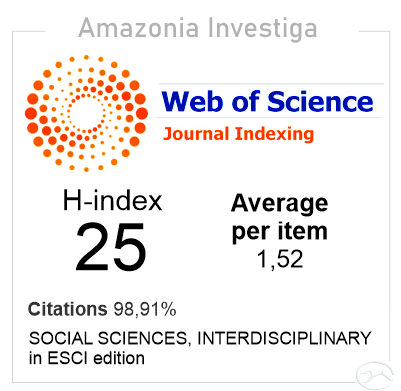



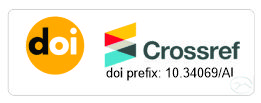
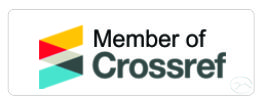


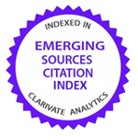
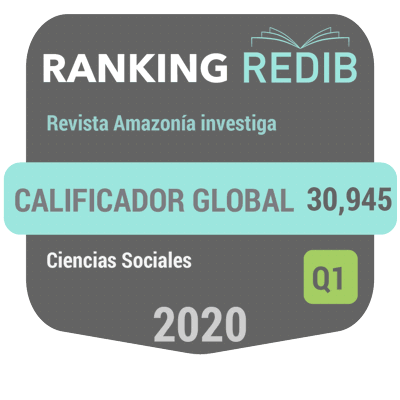







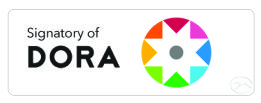
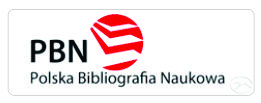
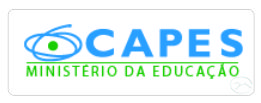

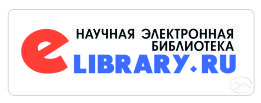

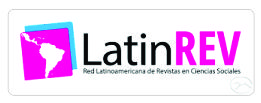


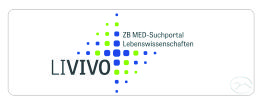



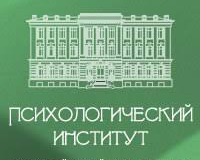












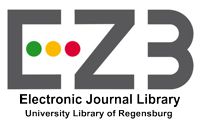

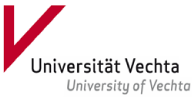



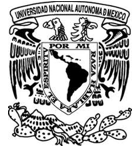
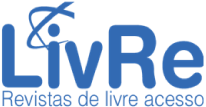










.gif)






